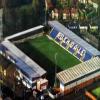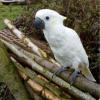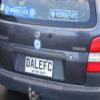| Orisi Dawai 10:55 - Sep 29 with 4507 views | Jimmy1510 |
Hi, I'm a Rochdale fan and sports journalist with Mancunian Matters. On my way to the game on Saturday I spotted a gravestone for Orisi Dawai in the cemetery, on which he is described as Fiji's greatest sportsman, so I thought it would be interesting to write an article on his life. Does anyone have any memories of him, or could tell me more about why he ended up in Rochdale? Cheers, Jimmy |  | | |  |
| Orisi Dawai on 11:03 - Sep 29 with 4468 views | Bainesy15 |
I don't know any facts but isn't there a large link between Fiji and Rochdale, something to do with a world cup or something? Isn't that why most/all of Fiji's rugby league world cup games were held at spotland? |  | |  |
| Orisi Dawai on 11:14 - Sep 29 with 4423 views | Delboy |
In the early 1960s a remarkable Rugby League revolution took place in Rochdale.
Rochdale Hornets played host to a group of Fijians, men that had never played the sport before, but men that were incredibly talented and brought flair and colour to the British game. Their arrival in England was big news at the time, as overseas players were hardly common, and certainly not of the sort that came from a small Pacific island where Rugby League wasn’t then played.
Their story is an amazing one, not known by many outside Rochdale.
The Chairman of Hornets at the time, Arthur Walker, was spending time in Australia in 1960, and decided to take a look at the touring Fijian rugby union side that was touring the country. Walker was impressed by the flamboyant skills of the Fijians, particularly the centre and captain Orisi Dawai and his rampaging winger Josefa Levula, and asked the pair if they wanted to try their luck at Rugby League back in England.
They jumped at the chance, but unfortunately could not gain permission from the Chief of Fiji to leave their home country. When the Chief died a year later, however, they were granted authorisation to leave for Rochdale, and in late 1961 they embarked on an adventure that would bring them great fame, both in England and back home in Fiji.
Dawai and Levula, who were cousins, landed at Manchester Airport in late 1961 amid great local intrigue, and came with an impressive pedigree. Both men were 28 years old and stood at over six feet tall, Dawai having made his name as a classy centre, while Levula — the Fijian sprint record holder at the time — had toured Australia, New Zealand and Tonga with his country’s union side. Dawai had actually agreed to play Rugby League for St George in Australia, but had been unable to obtain the necessary work permit documents.
“They were legends in Fiji,” remembers Mike Ratu, a school boy at the time, who would later go on to join his compatriots in a Hornets shirt. “To be leaving the country to go and play professional Rugby League in England was a very big thing for the people of Fiji, and they were given a big send-off by everyone when they left in 1961.”
Their arrival in the North of England was unprecedented, and they were immediately asked to appear on the BBC’s “Sportsview” programme with Eddie Waring. “We are looking forward to our stay in Rochdale and hope that we settle down into the side as quickly as possible,” said Dawai soon after arriving. “It is very cold, but not as cold as we expected it to be.”
The pair made their A-team debuts against Liverpool City in a 14-all draw less than a month later, scoring all their side’s points between them with Dawai crossing for a try and Levula netting a try and four goals. 1,525 curious people turned up to watch, five times the normal crowd size. The report that appeared in the Rochdale Observer described the Fijians “unorthodox tactics”, which “delighted spectators, with Dawai on the right often finding Levula on the left with his long passes.”
They made their first team debuts on 11th November 1961 in a 6-all draw with Whitehaven. Levula went on to have three highly successful seasons with Hornets, scoring 37 tries and 207 points in 80 appearances before leaving to join Bradford Northern for a fee of 1,500 pounds in 1964.
He was renowned for trying to run over the top of opposing wingers rather than round them, and his sheer size and power all too often proved too much for his opponents. Dawai, on the other hand found the switch of codes more difficult, and appeared in Hornets colours only ten times. He was to die very suddenly as a young man in 1966 in Birch Hill hospital, Rochdale.
“Orisi was like a father-figure to all the Fijians that came to Rochdale,” Ratu says. “He was an absolute gentleman and a big help to everyone. He was a terrific centre but he never quite achieved as much in League as he did in union. It was a great shame that he died so young.”
In December 1961 Hornets announced that they were negotiating with two Fijian forwards, Laitia Ravouvou, a 6ft 3 inch second rower, and prop or hooker Voate Driu. They arrived in England, along with the wives of Dawai and Levula, on 2nd February 1962 and again over 1,000 people watched their A-team debuts in a defeat against Salford. Ravouvou made his mark in the first team almost immediately but it took a little longer for Driu to settle in, and he didn’t appear during his first season.
In fact Ravouvou will always have a place in Rochdale folklore thanks to the time he managed to kick a goal in bare feet!
“We never played in boots back in Fiji,” Ratu explains, “but the cold weather over here meant that we had to — most of the time.” The next to arrive was winger Sitai Buroleva, during the 1962-63 campaign, but he made little impact, never appearing for the first team.
It was the sixth Fijian, Apsai Toga, who was to make arguably the biggest impression. 22 years old, 6ft 3 inches and over 16 stones, Toga arrived in Rochdale in January 1964 following the recommendation of his step brother Ravouvou, who was by then struggling a little to hold down his place in the side.
Toga was an immediate sensation with the Hornets fans, who loved his rampaging, destructive style of play. He soon formed a devastating second row partnership with Ravouvou, who came back into favour, and with Driu now also in the pack Hornets had a formidable looking set of forwards. Toga was to go on and make almost 100 appearances for the club and became one of the most respected second-rowers in the English game. He eventually left the club in May 1967 to play for St George in Sydney after Hornets refused to meet his huge wage demands. Tragically, Toga died in January 1969 aged just 27 years in Sydney. One of the most popular men ever to play for Hornets, he collapsed shortly after a training session and died of a heart attack. An all-action giant on the field, he was described by those who knew him as the perfect gentleman off it.
By 1965 Toga had been joined by the club’s seventh Fijian, Mike Ratu, a winger who had been playing for Stroud RU in Gloucester while serving in the army. Ratu — whose son Emon was to go onto play professional rugby for Hornets and Swinton over 20 years later — appeared over 100 times for the club during his six-year spell there.
“I was honoured to be playing for Rochdale Hornets, and to be playing alongside some of my old heroes from back home,” remembers Ratu. “It was very special for us to come over here. We came to see the lights, the buses, the snow.
“Rochdale is now very well known in Fiji thanks to those first pioneers who left the country all that time ago. Rugby union is the more dominant sport, but Hornets’ old Athletics Ground is better known than Twickenham, and many people have come to the town for a holidays.
“It would be nice to see some young Fijians carrying on an old tradition in Rochdale.” [Post edited 29 Sep 2021 11:21]
|  | |  |
| Orisi Dawai on 12:35 - Sep 29 with 4246 views | pioneer |
As a sports journalist you might consider engaging with the world wide web.
oodles of articles about this remarkable man. |  | |  |
| Orisi Dawai on 12:54 - Sep 29 with 4191 views | Jimmy1510 |
Thanks for the responses all, he sounds like a remarkable man and if I do end up writing an article on him then I will share it with you in here. |  | |  |
| Orisi Dawai on 19:21 - Sep 29 with 3766 views | Statzdale |
All four were playing members at Littleborough CC unfortunately due to rugby commitments, they were never available for selection. |  | |  |
| Orisi Dawai on 19:58 - Sep 29 with 3703 views | ncfc_chalky |
Absolutely fascinating read,it's amazing what history towns have if you delve a little |  |
|  |
| Orisi Dawai on 20:59 - Sep 29 with 3621 views | James1980 |
This is an excellent plot for a movie. |  |
|  |
Login to get fewer ads
| Orisi Dawai on 21:12 - Sep 29 with 3600 views | downunder |
| Orisi Dawai on 20:59 - Sep 29 by James1980 |
This is an excellent plot for a movie. |
Littleborough RUFC (previously Rochdalians) also has many links to the Fijians, and often hosted games between club XV and the Fijian ex Pats side. Had the honour and experience of playing for them once, when they were a couple of players short. Afterwards, much Cava was drunk, and food cooked in a hole in the ground (Hangi) eaten. Have visited the Islands several times...Bula Bula. |  | |  |
| |